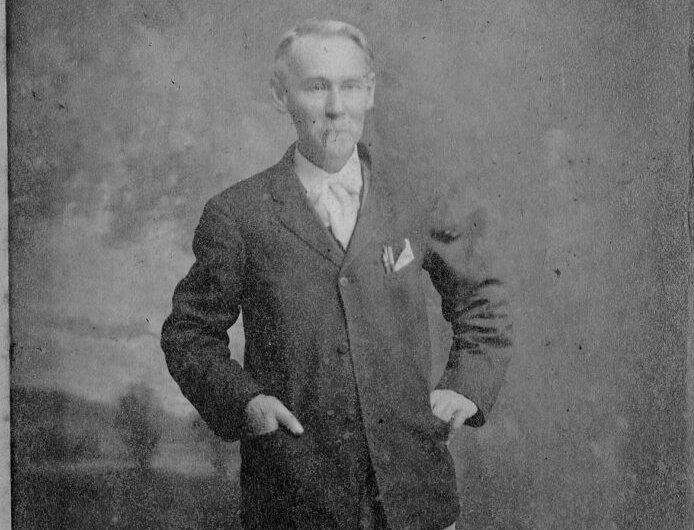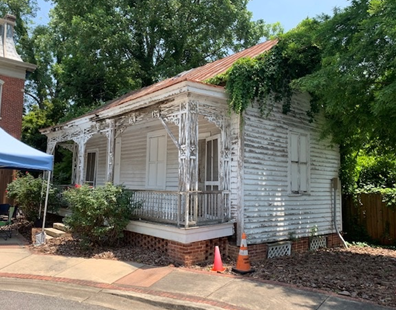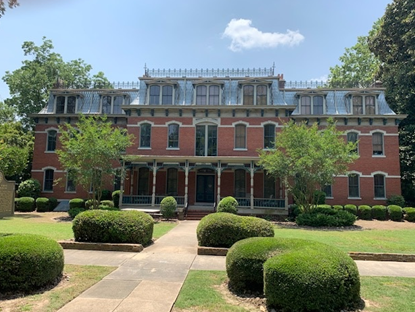The city Augusta has long been known as a hub of medical practice in the Southeast, a tradition that goes back over 200 years. Augusta University’s Medical College of Georgia joins Emory in Atlanta, Duke in North Carolina, Baylor Scott and White in Texas and the University of Alabama at Birmingham as being among the top-rated medical training facilities in the nation.
In Augusta, it all started with a tiny indigent-care hospital in downtown.
Savannah tries to claim bragging rights to having Georgia’s oldest full time operating hospital, but according to Erick Montgomery, executive director of Historic Augusta Inc., there is proof that the first hospital in the state was actually constructed in Augusta.
Records from Magnolia Cemetery and St. Paul’s Cemetery from 1817 indicates that some of the interred “died in hospital.”
That phrase is important because, at that time, only the poor would actually die in a hospital. People with any means to pay for medical care would be attended in their homes and would ultimately die at home.
“You wouldn’t want to go where the ‘unwashed’ were; you would want to die at home,” Montgomery said.
The city of Augusta allocated funding for a new city hospital in 1818, but Montgomery says the cemetery records show that a hospital already existed, and the new City Hospital was its replacement.
“It might have been some rickety buildings or maybe even tents, but I believe a hospital already existed,” Montgomery said.
Dr. Milton Anthony, Dr. Lewis Ford and Dr. Ignatius Garvey were instrumental in securing the funding for the wood framed hospital building on what is now the lot on 127 Telfair Street stretching all the way back to Greene Street, which was the original entrance.
According to the late Augusta historian Ed Cashin, in his book The Story of Augusta, those same men would later form the Board of Trustees of the Medical College of Georgia when that board was created by the state legislature in 1828.
The Civil War would cement Augusta’s standing as a “hospital city,” as hotels and churches were commandeered to handle overflow from City Hospital and the Medical College and to treat war wounded.
Cashin writes that wounded soldiers from burned out Atlanta were transported to Augusta as everyone held their breath, speculating that Sherman’s next intended victim was the Garden City.
As it turns out, the fact that Augusta was a hospital city was one of the determining factors in Sherman’s decisions to march around the city. After all, Sherman had cut his supply lines and had his men foraging for food, so why would he want to conquer a city with a huge population of injured and dying men?
In Berry Benson’s Civil War Book: Memoirs of a Confederate Scout and Sharpshooter, the man whose likeness is portrayed standing atop the Confederate Monument on Broad Street was in Augusta at the time, after escaping a Union POW camp. He recalled that everything from coffee to firewood was scarce.

For coffee, the desperate Augustans would dig up salt-packed soil from smokehouses, mix it with rye and boil up a concoction that had to taste rancid.
When Sherman invaded Savannah, Augusta’s population doubled with refugees and war wounded, according to Cashin.
After the war, City Hospital became University Hospital and moved to a new location. In 1869, the old City Hospital became the Widow’s Home and primarily served women who were war widows.
By 1887, the Widows Home had raised the funding to raze the nearly 70-year-old wooden building and replace it with the brick structure that stands in the location today.
By the early 1990s, the Widows Home provided shelter to indigent women whether widowed or not; however, Montgomery says that the need was not that great, and most of the space remained vacant.
A group of investors entered into negotiations to purchase the building with the intention of converting it to high-end condos; but plans fell through on the concept and, instead, the owners began planning to convert the building to Section 8 housing, sparking outrage in the Olde Towne neighborhood.
Historic Augusta Inc. held an easement on the property which meant the organization had first right of refusal if the building was placed on the market.
“We only owned the building for a second. Clay Boardman ended up buying it from us almost immediately,” Montgomery said.
Boardman then donated the building to Christ Community Healthcare, thereby reverting the property back to its original purpose of providing indigent medical care.

Outside of the brick main building are three wooden buildings. Two of the buildings are of the “saddlebag” style, that is, two rooms with separate entrances and sharing one fireplace, the other building is a one-room “shotgun” style.
Many have speculated that the buildings were once used as slave quarters, but Montgomery says that while the buildings likely date back to the original wood-frame hospital building, there is nothing in the historic record showing that the City Hospital owned slaves.
Also, one of the buildings has intricate carved and latticed porch supports, which is not something commonly found on slave quarters.
“One building definitely looks like it was used as an administrative office, and I’m just speculating, but the others were probably used for hospital overflow or perhaps for employees,’ Montgomery said.
…And that is something you may not have known.
Scott Hudson is the Senior Investigative Reporter and Editorial Page Editor for The Augusta Press. Reach him at scott@theaugustapress.com












